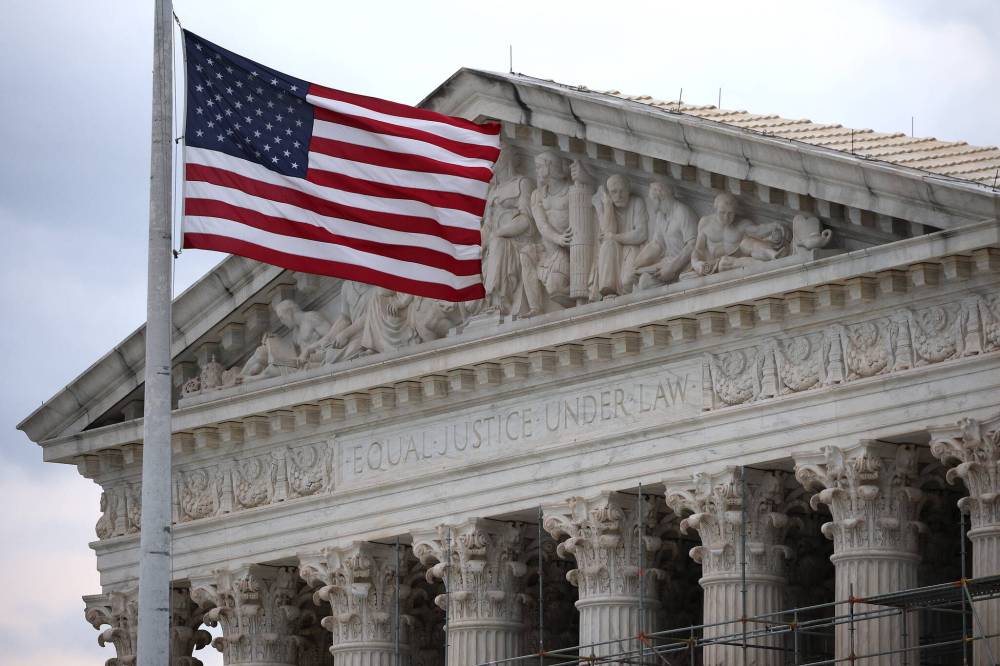Many Canadian eyes on America’s top court
Advertisement
Read this article for free:
or
Already have an account? Log in here »
To continue reading, please subscribe:
Monthly Digital Subscription
$0 for the first 4 weeks*
- Enjoy unlimited reading on winnipegfreepress.com
- Read the E-Edition, our digital replica newspaper
- Access News Break, our award-winning app
- Play interactive puzzles
*No charge for 4 weeks then price increases to the regular rate of $19.00 plus GST every four weeks. Offer available to new and qualified returning subscribers only. Cancel any time.
Monthly Digital Subscription
$4.75/week*
- Enjoy unlimited reading on winnipegfreepress.com
- Read the E-Edition, our digital replica newspaper
- Access News Break, our award-winning app
- Play interactive puzzles
*Billed as $19 plus GST every four weeks. Cancel any time.
To continue reading, please subscribe:
Add Free Press access to your Brandon Sun subscription for only an additional
$1 for the first 4 weeks*
*Your next subscription payment will increase by $1.00 and you will be charged $16.99 plus GST for four weeks. After four weeks, your payment will increase to $23.99 plus GST every four weeks.
Read unlimited articles for free today:
or
Already have an account? Log in here »
When oral arguments were presented Wednesday morning to the Supreme Court of the United States, Canada was just one of many interested parties listening intently to what was said.
The issue at hand before America’s highest court was tariffs — specifically, the legality of the manner in which U.S. President Donald Trump has unilaterally imposed them on virtually every one of his nation’s global trading partners.
In order to bypass the congressional approvals that are routinely required on matters of taxation and revenue, Trump has invoked the International Emergency Economic Powers Act. The 1977 law allows the president to regulate economic transactions during national emergencies; in order to invoke the law as the rationale for his wide-ranging and whim-motivated penalties, Trump has stretched the definitions of “national emergency” and “national security” to encompass pretty much anything or anyone in the global marketplace he doesn’t like at a particular moment in time.

win mcnamee / getty images Files
The U.S. Supreme Court
Trump’s tariff strategy has been challenged by numerous small business groups, as well as at least a dozen states, and lower courts have consistently ruled against the punitive policy. The Supreme Court case — which will require lengthy deliberation and likely won’t produce a decision for several months — will be a defining moment for Trump.
The White House’s position has been that trade deficits represent “an unusual and extraordinary threat to the national security and economy of the United States,” and that the imposition of tariffs at whatever level the president deems necessary is a justifiable strategy for levelling the playing field.
Opponents have rightly noted the U.S. has run trade deficits with many countries for several decades while maintaining productive relationships, and that the imposition of tariffs — a form of taxation — is a matter for Congress to decide as part of its statutory control of the nation’s finances.
During Wednesday’s presentations, U.S. Solicitor General D. John Sauer argued the central issue in this case is not “the power to tax,” which falls under congressional authority, but rather the ability to regulate foreign powers, and that the fact Trump’s tariffs produce revenue “is only incidental.”
That’s an interesting approach, given that Trump erroneously boasts almost daily about the “trillions” of dollars that are pouring into the U.S. economy as a result of his tariffs.
Meanwhile, the lawyer representing businesses challenging the tariffs, Neal K. Katyal, asserted it’s implausible that Congress’s intention in enacting IEEPA was “hand(ing) the president the power to overhaul the entire tariff system and the American economy in the process, allowing him to set and reset tariffs on any and every product from any and every country, at any and all times.”
He added that Trump is using the statute as “a one-way ratchet” to shift congressional powers to the presidency, and that “we will never get this power back if the government wins this case.”
Given the myriad other ways in which Trump appears to be rushing to consolidate power and upend the U.S.’s democratic traditions in favour of an authoritarian style of ruling, it’s clear never giving power back to the legislative branch is entirely his intention.
Should the decision in this case fall against the tariff scheme — and particularly if such a rejection is accompanied by a ruling the tariffs must, in whole or in part, be repaid — it will represent the most emphatic rebuke yet of Trump’s fiscal logic and authoritarian inclinations.
Given the manner in which Democratic candidates and measures swept this week’s off-year elections across the U.S., largely on the basis of the economic pain Americans are suffering, it might be the case that Trump’s eagerly sought grip on singular power is already being loosened.



